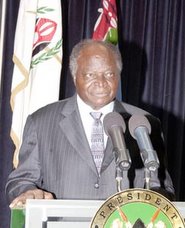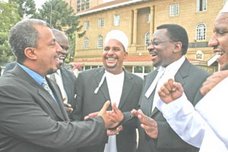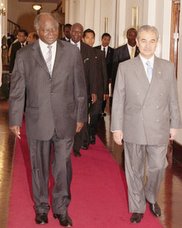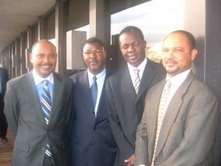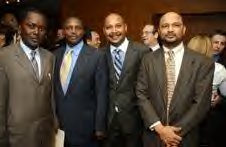
___________
In politics, the primary goal each and every politician strives for is survival. I therefore find it very disingenuous for any politician to accuse another’s strategy as being an act of political survival as if they themselves are not doing the same very thing. All those politicians who decamp from one party to another are among other things seeking political survival. Period.
For instance, President George W Bush’s Republican Party U.S senators have for a long time rallied behind his Iraq policy. The Iraq strategy has become very unpopular in the nation and the senators are now seen to be distancing themselves from the president’s failed Iraq policy, as they are very much aware that they soon will have to face the electorate in their re-election bids. Talk of political survival. Plain and simple.
In the local scene -- all government friendly legislators have congregated in NARC Kenya, presumably the party President Mwai Kibaki will use as his ticket to seek re-election. This is simply an act of political survival. It is hypocritical for anyone to accuse the group of Coast legislators led by the Transport Minister Chirau Mwakwere political move of joining Shirikisho as an act of political survival as if it is unique.
Mwakwere and Tourism & Wildlife Minister Morris Dzoro were both ‘given’ senior national party posts in NARC Kenya and could have remained in that party and all could have been well and good for them. They already had secured political survival kit by being in NARC Kenya. But for the interest of the Coast people they thought otherwise. They rightly came to a conclusion that it was high time for the Coastal region to have its own political party in order to be better positioned to bargain in national affairs on equal footing with other regions.
Since independence, and apart from independence politicians such as the late Ronald Ngala, truth be told, Coast has never produced such courageous leaders who dared and took a bold and equally intrepid political step, like the one last Sunday. Traditionally Coast politicians are known to have been happy to play very safe by gladly accepting to play second fiddle to their up-country counterparts. In this day and age Mvita MP Najib Balala and former Mombasa Mayor Taib A. Taib continue to play second fiddle to their up-country counterparts, by acting as poodles.
It is comprehensible for up-country politicians, particularly those from NARC Kenya, to castigate Mwakwere’s group of decamping from “their” party. Although not a loss to President Mwai Kibaki but it was indeed a big loss for NARC Kenya. But for Coast legislators and their cronies to do the same clearly indicates how some of the Coast politicians have a long way to go to grow up and mature in an open democratic arena’s competitive politics.
It is rhetoric for politicians such as the youthful Garsen MP Dunson Mungatana and his Lamu West counterpart Fahim Twaha to knowing pretend (or be naïve to believe) that they are only interested in joining national parties and are above tribal and or regional politics. Come to think of it the level of political immaturity displayed by these politicians is below being naïve.
Apart from KANU there isn’t and there will not be another ‘national party’ in a true sense in the foreseeable future. The era of one or two ‘national party’ politics is long gone. It is time for small parties, regional, sectarian and to some extent tribal ones to co-exist where they get the chance to unite with like minded ones to form separate grand coalitions. Perfect example is the dormant ruling NARC and ODM Kenya (with KANU as a member).
Mwakwere was on the mark when he noted: "There is no problem with Coast people having a party of their own and using it as a bargaining tool …since independence, Coast people have been used as tissue paper by political parties but time is rife for us to have a say in Kenyan politics by having our own political party".
Instead of being showered with praises by their Coast political colleagues for being daring because they snatched the chance that has availed itself to finally be represented at national level with their own political outfit, they are being criticized for their bold move. I would hope that the Coastals will now be awakened and will not be like the Palestinians who never miss the opportunity to miss the opportunity.
The bottom line here is that, if there was any time in the history of the Coast politics for the politicians, elected or otherwise, need to unite for the sake of their province and people like in other regions, then that time is now. This window of opportunity will take many years to avail itself again.
____________________
There was a joke that went around sometimes back when the Tanzanian founding President Mwalimu Julius Kabarange Nyerere was alive. It was said that Mwalimu Nyerere use to tell his compatriots that there was no need for them to spend all their hard money to travel to Europe, as ‘Ulaya’ is just north of their border – meaning Nairobi. Comparing to Dar es Salaam, our then city in the sun was ‘Little Europe’, perhaps still is.
Last week I was in Pakistan for week long visit where I toured their well planed and clean capital city of Islamabad. I also had the chance to visit the country’s second largest city of Lahore and Rawalpindi. Although I reside in the United States where infrastructural development is beyond comprehension, I was amazed how ‘developed’ Pakistani is but still a developing country. Their roads are great. Their highways like those in United Kingdomare are known as Motorways and have ‘three lanes’ each way. Our one lane Mombasa –Nairobi highway is a joke compared to their motorways. The motorway stretches for hundreds of miles. I must say their motorway (at least the one I traveled) seem better than those in United Kingdom that I have been on. And I must add that it was as good as the United States’ Interstate Highways, minus the hundreds of vehicles in America. Without a doubt the US has the very best highways in the world -- with four lanes each way.
Manning their motorways and or highways the Pakistani has what they call the Highway Police. This police corps appeared uncorrupted and did not stop any vehicle that traveled within the set speed limits, ours included.
I did not observe a single pot hole from Islamabad to Lahore, a 370 km journey. And interestingly we did not see any accident on the road but saw cleaners cleaning the highway. I asked my minders why are Highway Police uncorrupted, the answer was that they were well remunerated, and that, they directly benefit from the traffic ticket fines. The fines are divided into three portions -- one third to the federal government, one third to the Motorway maintenance department and one third distributed among the police corps. No need for them to ask for kitu kidogo.
If India is considered the sleeping giant then Pakistani with a population of 140 million is the next big thing. I understand that Kenya is doing a lot of business with Pakistani. I believe they are one of the largest consumers of our tea. Our High Commission is very much visible in the country of under the stewardship of Her Excellency Mrs. Mishi Masika Mwatsahu and her team of dedicated mission staff. I had a chance to visit our embassy and was welcomed and treated very well by the staff unlike in other Kenyan missions abroad. I even had the chance to personally meet the High Commissioner who was very courteous and made me feel at home.
Kenyans policy makers should look into this ‘next big thing’ and copy them as much as they can as opposed to always look up to Europe and North America for solutions. Instead of traveling to Europe and North America, Pakistani might the solutions our policy makes could be seeking as they will see what home grown development means. I found it very interesting that Pakistani despite being a military regime has a powerful political ruling party, a functioning federal legislature, and federal government. In addition as federal republic there are functioning and powerful provincial governments.
___________________
Perhaps President Bush might see the light and have the courage to change course in his Iraq policy. Two senior Republican senators, members of the influential Senate Foreign Relations Committee are calling for an exist strategy in Iraq, asked the president to look for a way out. Sen. Richard Lugar of Indiana is the top Republican on the Senate Foreign Relations Committee.
David Gergen, who has advised both Republican and Democratic presidents recently pointed out that ‘when Dick Lugar comes out against your foreign policy, it means your dam is breaking, and it means we're far more likely as a country to move from Plan A to Plan B this fall, when it comes to Iraq."
The other one is Sen. George Voinovich, from Ohio, who is already jumping straight to what he calls Plan "E" for "Exit." With no support of both the American people and the Congress Bush is prolonging what
It must remembered that, it Voinovich’s lone vote in the Foreign Relations Committee cost John Bolton’s confirmation as the US ambassador to the United Nations where Bush was forced to bulldoze him (Bolton) with a recess, albeit temporary appointment.
The ranking remember of the Foreign Relations Committee Lugar is one of Republican senators who was opposed Ronald Reagan’s “Constructive Engagement policy” with the then white South Africa apartheid regime.
omarahmedali@gmail.com
For instance, President George W Bush’s Republican Party U.S senators have for a long time rallied behind his Iraq policy. The Iraq strategy has become very unpopular in the nation and the senators are now seen to be distancing themselves from the president’s failed Iraq policy, as they are very much aware that they soon will have to face the electorate in their re-election bids. Talk of political survival. Plain and simple.
In the local scene -- all government friendly legislators have congregated in NARC Kenya, presumably the party President Mwai Kibaki will use as his ticket to seek re-election. This is simply an act of political survival. It is hypocritical for anyone to accuse the group of Coast legislators led by the Transport Minister Chirau Mwakwere political move of joining Shirikisho as an act of political survival as if it is unique.
Mwakwere and Tourism & Wildlife Minister Morris Dzoro were both ‘given’ senior national party posts in NARC Kenya and could have remained in that party and all could have been well and good for them. They already had secured political survival kit by being in NARC Kenya. But for the interest of the Coast people they thought otherwise. They rightly came to a conclusion that it was high time for the Coastal region to have its own political party in order to be better positioned to bargain in national affairs on equal footing with other regions.
Since independence, and apart from independence politicians such as the late Ronald Ngala, truth be told, Coast has never produced such courageous leaders who dared and took a bold and equally intrepid political step, like the one last Sunday. Traditionally Coast politicians are known to have been happy to play very safe by gladly accepting to play second fiddle to their up-country counterparts. In this day and age Mvita MP Najib Balala and former Mombasa Mayor Taib A. Taib continue to play second fiddle to their up-country counterparts, by acting as poodles.
It is comprehensible for up-country politicians, particularly those from NARC Kenya, to castigate Mwakwere’s group of decamping from “their” party. Although not a loss to President Mwai Kibaki but it was indeed a big loss for NARC Kenya. But for Coast legislators and their cronies to do the same clearly indicates how some of the Coast politicians have a long way to go to grow up and mature in an open democratic arena’s competitive politics.
It is rhetoric for politicians such as the youthful Garsen MP Dunson Mungatana and his Lamu West counterpart Fahim Twaha to knowing pretend (or be naïve to believe) that they are only interested in joining national parties and are above tribal and or regional politics. Come to think of it the level of political immaturity displayed by these politicians is below being naïve.
Apart from KANU there isn’t and there will not be another ‘national party’ in a true sense in the foreseeable future. The era of one or two ‘national party’ politics is long gone. It is time for small parties, regional, sectarian and to some extent tribal ones to co-exist where they get the chance to unite with like minded ones to form separate grand coalitions. Perfect example is the dormant ruling NARC and ODM Kenya (with KANU as a member).
Mwakwere was on the mark when he noted: "There is no problem with Coast people having a party of their own and using it as a bargaining tool …since independence, Coast people have been used as tissue paper by political parties but time is rife for us to have a say in Kenyan politics by having our own political party".
Instead of being showered with praises by their Coast political colleagues for being daring because they snatched the chance that has availed itself to finally be represented at national level with their own political outfit, they are being criticized for their bold move. I would hope that the Coastals will now be awakened and will not be like the Palestinians who never miss the opportunity to miss the opportunity.
The bottom line here is that, if there was any time in the history of the Coast politics for the politicians, elected or otherwise, need to unite for the sake of their province and people like in other regions, then that time is now. This window of opportunity will take many years to avail itself again.
____________________
There was a joke that went around sometimes back when the Tanzanian founding President Mwalimu Julius Kabarange Nyerere was alive. It was said that Mwalimu Nyerere use to tell his compatriots that there was no need for them to spend all their hard money to travel to Europe, as ‘Ulaya’ is just north of their border – meaning Nairobi. Comparing to Dar es Salaam, our then city in the sun was ‘Little Europe’, perhaps still is.
Last week I was in Pakistan for week long visit where I toured their well planed and clean capital city of Islamabad. I also had the chance to visit the country’s second largest city of Lahore and Rawalpindi. Although I reside in the United States where infrastructural development is beyond comprehension, I was amazed how ‘developed’ Pakistani is but still a developing country. Their roads are great. Their highways like those in United Kingdomare are known as Motorways and have ‘three lanes’ each way. Our one lane Mombasa –Nairobi highway is a joke compared to their motorways. The motorway stretches for hundreds of miles. I must say their motorway (at least the one I traveled) seem better than those in United Kingdom that I have been on. And I must add that it was as good as the United States’ Interstate Highways, minus the hundreds of vehicles in America. Without a doubt the US has the very best highways in the world -- with four lanes each way.
Manning their motorways and or highways the Pakistani has what they call the Highway Police. This police corps appeared uncorrupted and did not stop any vehicle that traveled within the set speed limits, ours included.
I did not observe a single pot hole from Islamabad to Lahore, a 370 km journey. And interestingly we did not see any accident on the road but saw cleaners cleaning the highway. I asked my minders why are Highway Police uncorrupted, the answer was that they were well remunerated, and that, they directly benefit from the traffic ticket fines. The fines are divided into three portions -- one third to the federal government, one third to the Motorway maintenance department and one third distributed among the police corps. No need for them to ask for kitu kidogo.
If India is considered the sleeping giant then Pakistani with a population of 140 million is the next big thing. I understand that Kenya is doing a lot of business with Pakistani. I believe they are one of the largest consumers of our tea. Our High Commission is very much visible in the country of under the stewardship of Her Excellency Mrs. Mishi Masika Mwatsahu and her team of dedicated mission staff. I had a chance to visit our embassy and was welcomed and treated very well by the staff unlike in other Kenyan missions abroad. I even had the chance to personally meet the High Commissioner who was very courteous and made me feel at home.
Kenyans policy makers should look into this ‘next big thing’ and copy them as much as they can as opposed to always look up to Europe and North America for solutions. Instead of traveling to Europe and North America, Pakistani might the solutions our policy makes could be seeking as they will see what home grown development means. I found it very interesting that Pakistani despite being a military regime has a powerful political ruling party, a functioning federal legislature, and federal government. In addition as federal republic there are functioning and powerful provincial governments.
___________________
Perhaps President Bush might see the light and have the courage to change course in his Iraq policy. Two senior Republican senators, members of the influential Senate Foreign Relations Committee are calling for an exist strategy in Iraq, asked the president to look for a way out. Sen. Richard Lugar of Indiana is the top Republican on the Senate Foreign Relations Committee.
David Gergen, who has advised both Republican and Democratic presidents recently pointed out that ‘when Dick Lugar comes out against your foreign policy, it means your dam is breaking, and it means we're far more likely as a country to move from Plan A to Plan B this fall, when it comes to Iraq."
The other one is Sen. George Voinovich, from Ohio, who is already jumping straight to what he calls Plan "E" for "Exit." With no support of both the American people and the Congress Bush is prolonging what
It must remembered that, it Voinovich’s lone vote in the Foreign Relations Committee cost John Bolton’s confirmation as the US ambassador to the United Nations where Bush was forced to bulldoze him (Bolton) with a recess, albeit temporary appointment.
The ranking remember of the Foreign Relations Committee Lugar is one of Republican senators who was opposed Ronald Reagan’s “Constructive Engagement policy” with the then white South Africa apartheid regime.
omarahmedali@gmail.com








